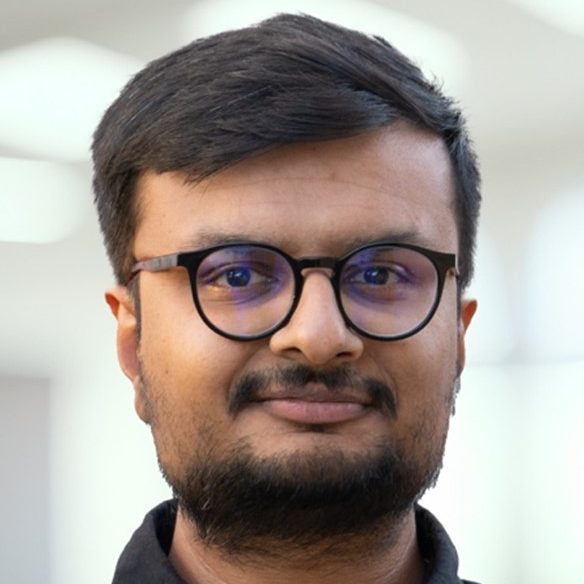Dr Dharmesh D Bhuva & Dr Chin Wee Tan
WORKSHOP: Deciphering the tumour microenvironment through the analysis of high-resolution spatial molecular data
Biological systems are complex and heterogeneous, involving a diverse suite of cells with unique functions, interacting and communicating to produce complex behaviour at the tissue-level. Understanding such complexity requires detailed measurements that are now made possible through emerging sub-cellular resolution spatial molecular technologies. These technologies allow us to measure the activity of 100s of genes across >100,000 cells from a biological tissue. In the context of cancer, these technologies allow us to study how cancer cells interact with their environment to survive. To unleash the power of these technologies, we need appropriate bioinformatics analysis to generate biological insight.
In this workshop, we will begin with a brief lecture introducing the technology, data, and standard bioinformatics analysis pipeline. We will then analyse a sub-sampled spatial transcriptomics dataset to demonstrate quality control, normalisation, cell typing, cellular niche identification, and niche-specific functional analysis. We will use spatially aware computational methods to perform analyses where such methods are available. At the end of the workshop, attendees will be equipped with the computational tools and data structures used to analyse spatial transcriptomics datasets. They will also be able to analyse their own spatial transcriptomics datasets and decipher complex behaviour in their biological systems of interest.
Keywords: Spatial transcriptomics, gene-set enrichment analysis, differential expression, normalization, tumour microenvironment
Requirements: Attendees will require a laptop with internet access and should have familiarity with R, some familiarity with Bioconductor. Some basic knowledge on spatial transcriptomics technologies and the standard steps needed to gain insight from the data they generate is desirable but not required.
Relevance: This workshop will be relevant to anyone interested in analysing data from emerging high-resolution imaging-based spatial molecular technologies such as 10x Xenium, NanoString CosMx, and Vizgen MERSCOPE.

Dr Dharmesh D Bhuva
Senior post-doctoral researcher (Mangiola lab), South Australian Immunogenomics Cancer Institute (SAiGENCI), The University of Adelaide
Dr Dharmesh D Bhuva is an early-career computational systems biologist who is passionate about understanding how complex systems of gene regulation and signalling lead to diverse molecular phenotypes in biological tissues. He completed his PhD in 2020 under the supervision of Prof. Edmund Crampin and Prof. Melissa Davis at the University of Melbourne and WEHI. His PhD focused on developing new systems biology approaches to study molecular function and gene regulation in cancer systems. He then undertook his post-doctoral studies with Prof. Melissa Davis at the world-renowned WEHI Bioinformatics division, where he developed novel approaches to study cancer tissues using spatial molecular data. In 2023, he joined the computational systems oncology division at the South Australian Immunogenomics Cancer Institute (SAiGENCI) to continue his cutting-edge research in developing computational approaches to analyse high resolution spatial molecular data. He has published his bioinformatics approaches in NAR and Genome Biology and has implemented them into open-source software that have had more than 100,000 downloads. He was part of a team that was recently awarded a MRFF to identify spatial biomarkers of response to therapy in lung cancer and has recently been awarded an NHMRC EL1 investigator grant to identify topological biomarkers in cancer.

Dr Chin Wee Tan
Senior Research Officer, Division of Bioinformatics, WEHI
Dr Chin Wee Tan is a leading computational biologist at the Walter and Eliza Hall Institute of Medical Research (WEHI). He completed his PhD in Biomedical Engineering (Computational Systems Biology) from the University of Melbourne in 2011. He then led a systems biology group utilizing state-of-the-art imaging technologies to spearhead computational approaches for interrogating biological systems. Since 2019, he has been focusing on computational bioinformatics, specifically the development of computational tools for the analyses of spatial multi-modal datasets. Dr Tan co-led development of bioinformatics pipelines and tools for spatial transcriptomics analyses in COVID-19 autopsy and cancer related studies. These include the Bioconductor package standR for analysis of data generated from Nanostring’s GeoMx DSP and workflows for CosMx data. Dr Tan has published widely in high impact journals such as European Respiratory Journal, Nucleic Acids Research, Genome Biology, eBioMedicine and Gut. Dr Tan was awarded the 2021 Australian Academy of Science and DISER’s Regional Collaborations Programme COVID-19 Digital Grant and more recently, as part of the team awarded with a Medical Research Future Fund worth ~$AUD 1M to study lung cancer using spatial technologies and analyses (led by Dr Kulasinghe at the University of Queensland).
